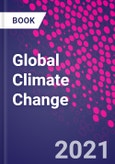Global Climate Change presents both practical and theoretical aspects of global climate change from across geological periods. It addresses holistic issues related to climate change and its contribution in triggering the temperature increase with a multitude of impacts on natural processes. As a result, it helps to identify the gaps between policies that have been put in place and the continuously increasing emissions. The challenges presented include habitability, biodiversity, natural resources, and human health. It is organized into information on the past, present, and future of climate change to lead to a more complete understanding and therefore effective solutions.
Placing an emphasis on recent climate change research, Global Climate Change helps to bring researchers and graduate students in climate science, environmental science, and sustainability up to date on the science of climate change so far and presents a baseline for how to move into the future effectively.
Please Note: This is an On Demand product, delivery may take up to 11 working days after payment has been received.
Table of Contents
1. Climate change and existential threats2. Impact of climate change on biodiversity and shift in major biomes
3. Climate-resilient agriculture: enhance resilience toward climate change
4. Influence of anthropocene climate change on biodiversity loss in different ecosystems
5. Link between air pollution and global climate change
6. Dimensions of climate change and its consequences on ecosystem functioning
7. Climate change: impact on agricultural production and sustainable mitigation
8. Geological records of climate change
9. Global climate change: the loop between cause and impact
10. Development of abiotic stressetolerant mustard genotype through induced mutagenesis
11. Impact of tropospheric ozone pollution on wheat production in Southeast Asia: an update
12. Past and present events of climate change: natural versus anthropogenic causes
13. Radioecology: dissecting complexities of radionuclide transfer under climate change
14. Climate change and flood risk, global climate change
15. Role of phytopesticides in sustainable agriculture
16. A review on the fatal impact of pesticide toxicity on environment and human health
17. Impact of climate change on wetlands, concerning Son Beel, the largest wetland of North East, India
Authors
Suruchi Singh Assistant Professor, Sunbeam College for Women, Varanasi, India. Dr. Suruchi Singh is presently working as Faculty in the Department of Botany, Sunbeam College for Women, India. She obtained her PhD from Banaras Hindu University, India in Botany with Environmental Science as major field. Dr Singh received her postdoctoral experiences in Department of Botany, Banaras Hindu University under Council of Scientific and Industrial Research and Department of Science and Technology. She has published articles in various international journals and books series (>40 peer reviewed articles). In her research, she has identified processes and activities where environmental efficiencies of selected crop plants must be increased against UV-B and tropospheric Ozone. Pardeep Singh Assistant Professor, Department of Environmental Studies, PGDAV College, University of Delhi, New Delhi, India. Dr. Pardeep Singh is an Assistant Professor at the Department of Environmental Science, PGDAV College, University of Delhi, in New Delhi, India. He obtained his PhD at the Indian Institute of Technology (Banaras Hindu University) Varanasi. Dr. Singh has published more than 65 papers in international journals in the fields of waste management, environmental pollution, and agricultural nanotechnology, and has co-edited 30 books. Rangabhashiyam Selvasembian Associate Professor, Department of Environmental Science and Engineering, School of Engineering and Sciences, SRM University-AP, Amaravati, Andhra Pradesh, 522240, India.Dr. Rangabhashiyam Selvasembian is currently working as Associate Professor in the Department of Environmental Science and Engineering, School of Engineering and Sciences, SRM University-AP, India. Previously worked in the Department of Biotechnology, School of Chemical & Biotechnology, SASTRA Deemed University, India. He received his Doctor of Philosophy degree from National Institute of Technology Calicut, India. He was awarded Post-Doctoral Fellowship by Max Planck Institute for Dynamics of Complex Technical Systems, 2015, Germany. He was further awarded the National-Post Doctoral Fellowship from SERB-DST, 2016-2018, India. Dr Selvasembian was awarded as Young Scientist by DST, India for the BRICS Conclave held in Durban, 2018, South Africa and was the recepient of Hiyoshi Young Leaf Award from Hiyoshi Ecological Services, Hiyoshi Corporation, 2018, Japan. His major research interests are bioremediation and waste?water treatment. He is Editorial Board Member in Separation & Purification Reviews, Scientific Reports, Biomass Conversion and Biorefinery and Environmental Management. He is also serving as Associate Editor in International Journal of Environmental Science and Technology, IET Nanobiotechnology, Frontiers in Environmental Chemistry and also as an Academic Editor for Adsorption Science and Technology. He has published more than 100 peer reviewed interna?tional research articles and contributed several book chapters. He is editing books from prestigious publishers such as Elsevier, Wiley, CRC and Springer. Recently Dr Selvasembian was listed in Top 2% most cited research scientist in the world as per data published by Stanford University USA.
K.K. Srivastava Associate Professor, PGDAV College, University of Delhi, New Delhi, India.. K.K. Srivastava is an Associate Professor , PGDAV College , University of Delhi, New Delhi India . He also runs his own consulting company, K3A Advisory Services Private Limited. KKS started his professional life with the communication agency Niche Communications where his responsibilities included providing strategic inputs for marketing communication of brands. Later he worked with his colleague and partner to provide backgrounders on Indian economy, polity and society to media groups like the New York Times, German TV, BBC and so on. KKS has more than 60 articles and research papers to his credit on diverse topics in Economics, Marketing, Advertising, Human Resource Management and Environmental Studies.







